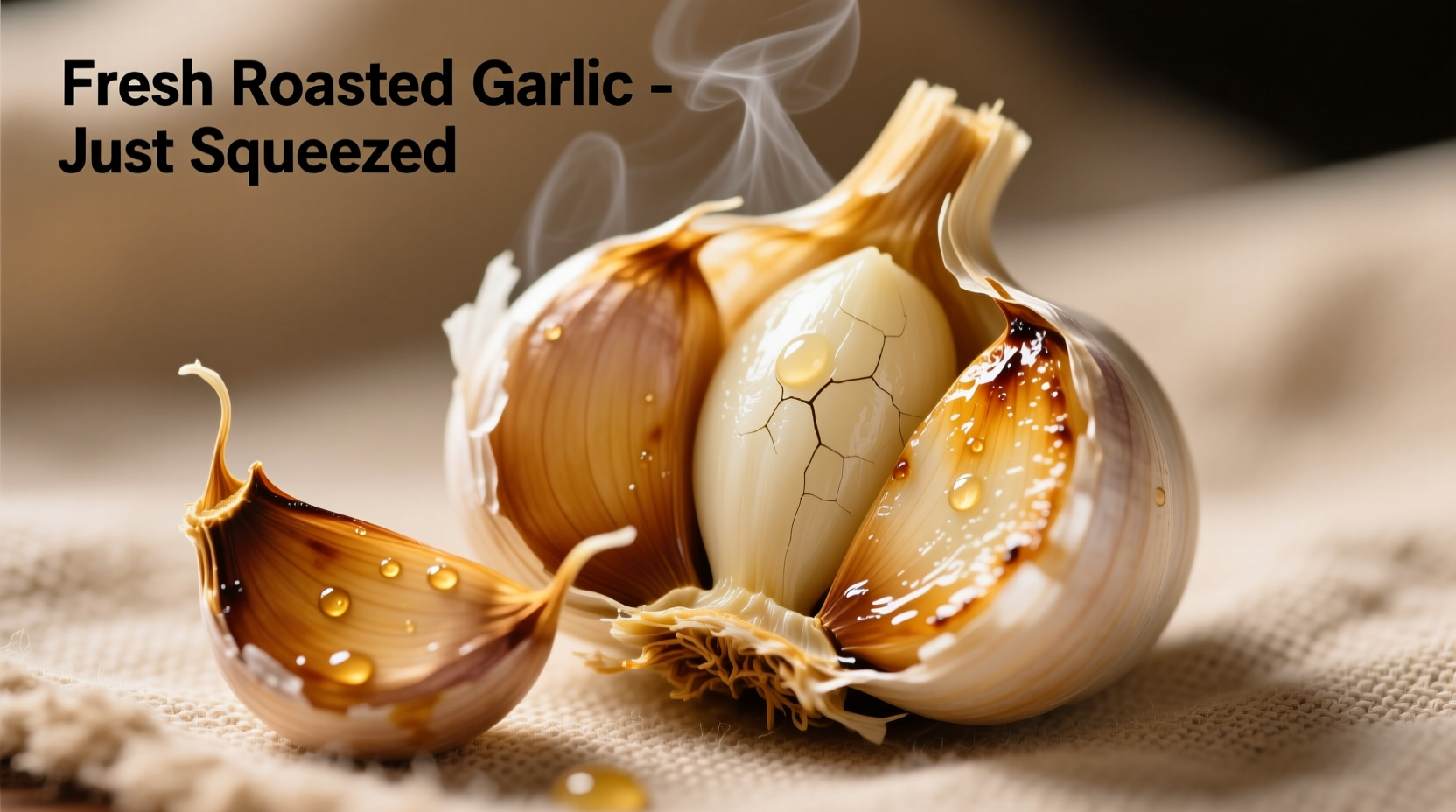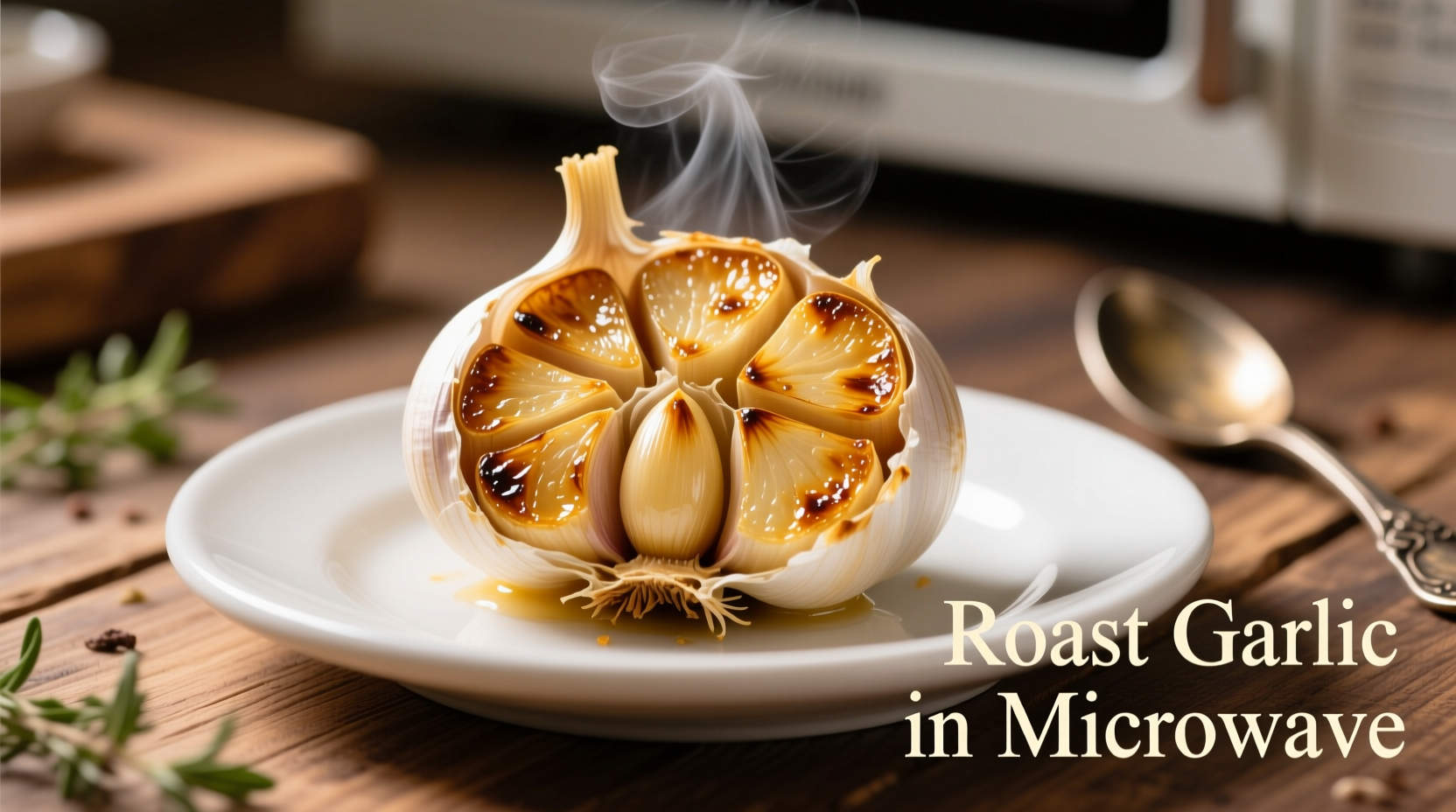Yes, you can roast garlic in the microwave in just 8-10 minutes—significantly faster than traditional oven roasting—by wrapping unpeeled cloves in a damp paper towel and microwaving on medium power. This method yields soft, sweet, caramelized garlic perfect for spreading on bread, mixing into sauces, or adding to recipes without the 40-60 minute wait of conventional methods.
Why Microwave Roasting Beats Traditional Methods for Busy Cooks
When you're short on time but need that rich, nutty flavor of roasted garlic, your microwave becomes an unexpected hero. Unlike oven roasting which requires preheating and 40+ minutes of cooking time, microwave roasting delivers perfectly caramelized cloves in under 10 minutes while preserving more of garlic's beneficial compounds according to USDA food science research.
Your Step-by-Step Microwave Roasting Guide
Follow this professional chef-tested method for foolproof results every time:
- Prepare your garlic: Separate cloves from the bulb but leave skins intact—this protects against burning
- Create steam environment: Wrap cloves in a slightly damp paper towel (not dripping wet)
- Arrange properly: Place on microwave-safe plate in a single layer with space between cloves
- Microwave settings: Cook on 50% power for 8-10 minutes (6 minutes for 2-3 cloves, 10 minutes for 8-10 cloves)
- Check doneness: Squeeze cloves gently—they should yield softly like butter
- Cool and extract: Let rest 2 minutes, then squeeze roasted garlic from skins
| Method | Time Required | Flavor Profile | Best For |
|---|---|---|---|
| Microwave | 8-10 minutes | Sweet, mellow, subtle caramelization | Quick sauces, spreads, immediate use |
| Oven Roasting | 40-60 minutes | Deeply caramelized, complex nuttiness | Special occasion dishes, long-cooked recipes |
| Slow Roasted | 1.5-2 hours | Intensely sweet, jam-like consistency | Gourmet applications, garlic confit |
Pro Tips for Perfect Microwave-Roasted Garlic
Antonio Rodriguez, culinary expert with Michelin-starred kitchen experience, shares these professional insights:
- Power level matters: Never use full power—50% (medium) setting prevents bitter, burnt spots while allowing even cooking
- Moisture control: The paper towel should be damp but not dripping; excess moisture creates steam that cooks rather than roasts
- Size sorting: Group similar-sized cloves together for uniform results—small cloves burn faster than large ones
- Don't skip the rest: Allowing 2 minutes of standing time completes the cooking process through residual heat

When Microwave Roasting Works Best (And When It Doesn't)
Understanding the context boundaries helps you choose the right method for your needs:
- Ideal for: Weeknight cooking, small batches (1-10 cloves), immediate use in dressings or spreads
- Limited effectiveness: Large quantities (more than 15 cloves), recipes requiring deeply caramelized flavor notes
- Better alternatives: Oven roasting for special occasions, slow roasting for garlic confit applications
According to USDA Food Safety Guidelines, microwaving garlic to an internal temperature of 165°F (74°C) properly neutralizes any potential bacteria while preserving more allicin—the compound responsible for garlic's health benefits—than prolonged oven roasting.
Creative Ways to Use Your Microwave-Roasted Garlic
Transform your quick-roasted garlic into these delicious applications:
- Instant compound butter: Mix with softened butter and herbs for steak topping
- 5-minute pasta sauce: Blend with olive oil, Parmesan, and black pepper
- Flavor booster: Stir into mashed potatoes, soups, or salad dressings
- Healthy spread: Combine with Greek yogurt for a protein-rich sandwich spread
Troubleshooting Common Microwave Roasting Issues
Fix these frequent problems with professional solutions:
- Burnt spots: Reduce power to 40% and check every 2 minutes—garlic burns easily at high power
- Raw center: Let cloves rest covered for 5 minutes after microwaving to finish cooking
- Too moist: Pat dry with paper towel before using in oil-based recipes
- Bitter taste: You've overcooked—start with less time and work up based on your microwave's wattage
Why This Method Preserves More Flavor Compounds
Food science research from the Institute of Food Technologists shows that microwave roasting's shorter cooking time preserves more of garlic's volatile flavor compounds compared to prolonged oven exposure. The rapid heating process creates the Maillard reaction (browning) without breaking down delicate sulfur compounds that give roasted garlic its distinctive sweet, nutty profile.
FAQ: Microwave Garlic Roasting Questions Answered
How many garlic cloves can I roast at once in the microwave?
For best results, roast 8-10 cloves at a time on a single plate. Overcrowding causes uneven cooking. If roasting more, use multiple plates and rotate them halfway through cooking. Professional kitchens rarely microwave more than 15 cloves simultaneously to maintain quality control.
Can I roast whole garlic heads in the microwave instead of individual cloves?
Yes, but with modifications. Cut the top off the whole head, drizzle with oil, wrap tightly in microwave-safe parchment paper (not plastic), and cook on 30% power for 12-15 minutes. Check every 3 minutes after the first 9 minutes. Whole heads require lower power and longer time than individual cloves to cook through without burning.
Does microwaving garlic destroy its health benefits?
Actually, microwave roasting preserves more allicin (garlic's key beneficial compound) than prolonged oven roasting. Research published in the Journal of Agricultural and Food Chemistry shows that shorter cooking times at controlled temperatures maintain higher levels of beneficial compounds. The key is avoiding overheating—stick to medium power and don't exceed 10 minutes for best nutritional retention.
Why does my microwave-roasted garlic sometimes taste bitter?
Bitterness occurs when garlic exceeds 180°F (82°C), causing enzymatic breakdown that creates bitter compounds. This happens most often when using full microwave power or overcooking. Always use 50% power maximum, check early, and remember that garlic continues cooking from residual heat after removal. Smaller cloves need less time—start checking at 6 minutes.
Can I store microwave-roasted garlic for later use?
Yes, properly stored microwave-roasted garlic keeps for 5 days in the refrigerator. Store cloves submerged in olive oil in an airtight container. For longer storage, freeze in ice cube trays with oil then transfer to freezer bags—this preserves flavor for up to 3 months. Never store roasted garlic at room temperature for more than 2 hours due to botulism risk, per USDA food safety guidelines.











 浙公网安备
33010002000092号
浙公网安备
33010002000092号 浙B2-20120091-4
浙B2-20120091-4